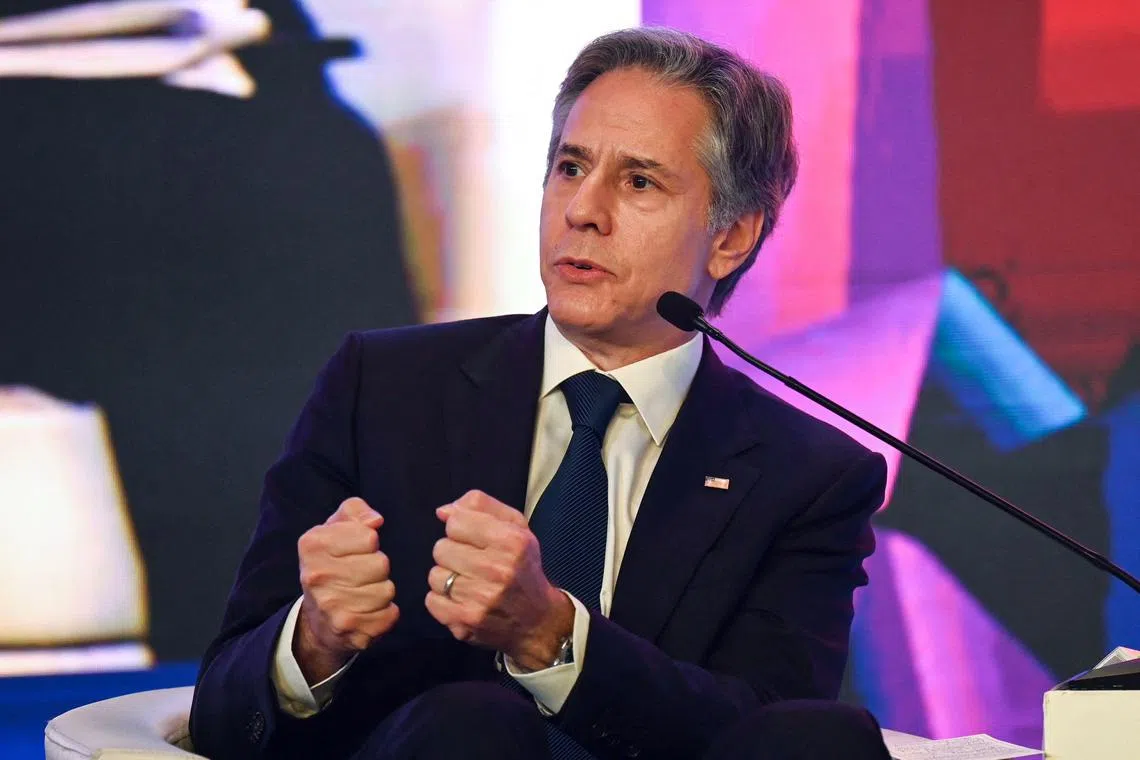Ukraine war could embolden other aggressors, says US Secretary of State Blinken after Quad meeting
Sign up now: Get insights on Asia's fast-moving developments

Antony Blinken's remarks come amid tensions between China and the US over Taiwan, among other pressure points.
PHOTO: AFP
Follow topic:
NEW DELHI - Amid tensions with China and Russia, US Secretary of State Antony Blinken said on Friday that the Ukraine war could embolden “aggressors” in other parts of the world.
“Allowing Russia to do what it is doing is a message to would-be aggressors everywhere that they may be able to get away,” Mr Blinken said after a meeting of the Quadrilateral Security Dialogue (Quad), which comprises the United States, India, Japan and Australia.
While he did not mention China by name, his remarks come amid tensions between China and the US over Taiwan,
China views the Quad as the “Asian version of Nato” to contain its rise, a charge denied publicly by the Quad members, with India defining the grouping as “a force for global good”.
Mr Blinken was speaking during a panel discussion at the Raisina Dialogue, an annual multilateral forum, with his Quad counterparts immediately after their breakfast meeting.
A Quad statement released after the meeting addressed the ongoing maritime disputes in the South and East China seas as well as the war in Ukraine, pushing for adherence to international laws.
The four Quad countries also agreed that “the use or threat of use of nuclear weapons is inadmissible”, amid Russian President Vladimir Putin’s warnings that the threat of a nuclear war is rising.
The focus on Ukraine during the Quad meeting had continued from a Group of 20 (G-20) Foreign Ministers’ Meeting in New Delhi on Thursday, which failed to issue a joint statement due to differences over the war and instead produced an “outcome document”.
Differences arose over wording to describe the war, with Russia and China refusing to fully endorse even the outcome document, which states: “Most members strongly condemned the war in Ukraine.”
An outcome document was also issued during the G-20 Finance Ministers’ Meeting
Analysts said the G-20 meetings highlighted the deepening fault lines between the West on one side, and China and Russia on the other.
On the sidelines of the G-20 summit on Thursday, Mr Blinken met his Russian counterpart Sergei Lavrov and told him to “end this war of aggression” against Ukraine.
The 10-minute meeting was the first time Mr Blinken had met Mr Lavrov since the war broke out in February 2022.
“The fault line is deepening. What is interesting is that Russia and China have distanced themselves from the rest of the (G-20) grouping,” said Professor C. Raja Mohan, visiting research professor at the Institute of South Asian Studies.
He noted that the Quad grouping, in spite of India’s refusal to directly condemn Russia, had also taken a tougher stance on the war than in earlier statements.
India, which holds the G-20 presidency, had sought to bridge the gap between the two sides in the G-20 meetings.
India is in a unique position as it has refused to take sides in the war and has abstained from voting against Russia in the United Nations Security Council, much to the West’s initial frustration.
At the same time, New Delhi has stepped up pressure on Russia to end the war and come to the negotiating table.
The balancing act has been necessitated by strategic considerations, given the longstanding defence and deepening energy ties with Russia.
Still, analysts said it could get tougher for India to continue its balancing act amid deepening tensions.
“Certainly, there is no doubt about it. The longer the war goes on, the more pressure India comes under to take a tougher stand,” said Professor Alka Acharya of Jawaharlal Nehru University.
“There is this pull to suck India into the strategic equations of the West and the push of projecting India as a great and global power... the point is how long can India sit on the fence.”
While the differences among G-20 members over Ukraine hit the headlines, Indian officials have highlighted how New Delhi worked to get consensus on issues like food and energy security, where all the countries agreed that the supply chains of food and fertilisers “should be kept reliable, open and transparent”.
“There was agreement on various aspects of strengthening multilateralism, on promoting food and energy security, on climate change, climate action, ensuring biodiversity, on gender issues,” said External Affairs Minister S. Jaishankar. “So on the bulk of the issues, we were able to get an outcome document.”


